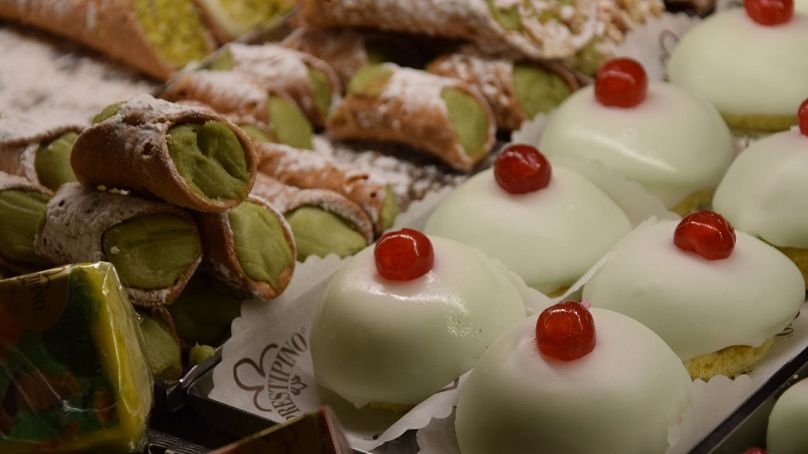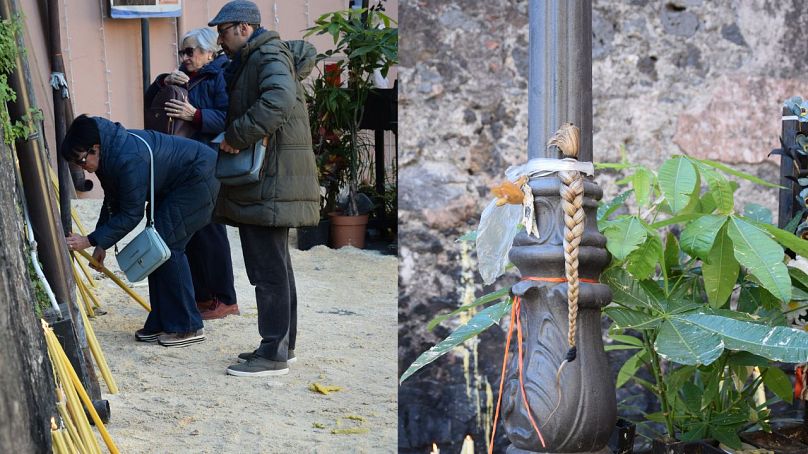Every year, during the first week of February, the Italian city of Catania in Sicily marks the Feast of Saint, the third-largest religious celebration in the world. This year is different however from all the others because the saint has become the symbol of the fight against gender-based violence.
The bells have been ringing throughout the streets of Catania this week as thousands of faithful, dressed in white robes and black hats, pull the long 100 metre ropes attached to the statue and relics of the city's patron saint Agatha.
 ADVERTISEMENT
ADVERTISEMENT
 ADVERTISEMENT
ADVERTISEMENT
The Feast of Saint Agatha is the world's third-largest religious celebration, attracting more than a million believers and non-believers from around the globe in the first week of February.
For many, the city's patron saint is a symbol of rebellion against patriarchy.
In 249 AD, at the age of 15, Agata vowed to consecrate herself to God. However, Quinziano, tasked by Emperor Decius to persecute Christians, fell in love with her with horrific consequences.
The young woman, who rejected his advances, was subjected to atrocious torture, including the removal of her breasts, and sentenced to die at the stake, but an earthquake interrupted the execution. Shortly after, she died a martyr in prison in 252 AD.
"Long live Saint Agatha!" a chorus of the faithful loudly recites as the statue passes by. "Saint Agatha is alive." Amidst the crowd in Catania, people of all ages celebrate, greeting their patron saint as she walks the streets.
This unique occurrence happens only once a year, commemorating her death, as she typically resides within the Cathedral of Catania.
But this year is not like any other. At a certain point during the celebration, silence falls upon the city. The dances come to a halt, and so do the choirs. The Bishop of Catania, Luigi Renna, recalls that just last week in Catania, a 13-year-old girl was assaulted in a public park by seven boys, with her boyfriend forced to witness the tragedy.
"There is a person, and perhaps many others, who tonight experiences the celebration of Saint Agatha with pain - the 13-year-old girl who was raped last week in Villa Bellini. It is important that the name of this girl remains anonymous out of respect. We want to entrust to her and all women who suffer violence," he said.
"There is moral degradation, the kind that arises from the misuse of social media, which has trivialised sexuality and transformed young people into a pack rather than friends."
From social movements to law changes
While, on one hand, social media may have 'trivialised sexuality,' it has also served as a platform for conducting campaigns aimed at raising awareness against gender-based violence.
Perhaps, one of the most notable remains the #MeToo movement, which exploded in the US seven years ago, shaking Hollywood to its core and sparking worldwide conversations about the sexism, sexual harassment, and abuse suffered by women across various industries.
Even the United Nations has joined the trend, as seen with the #NoExcuse initiative launched by the United Nations' UN Women last November during the 16 Days of Activism, aimed at advocating against violence towards women.
In anticipation of Saint Agatha week, Thamaia, an Italian association against gender violence, launched a communication campaign featuring Saint Agatha as 'a woman who said no.'
"Campaigns play a very important role because they certainly stimulate reflection and have an impact on change," Thamaia president, Anna Agosta, told Euronews Culture.
"We wanted to overturn the narrative of Agata because she has always been considered a symbol of purity, the 'santuzza (the young saint)'. She was never identified as a strong woman. Now, I must say, also thanks to our campaign, I've heard many, many people say Agata is a woman who said no. For us, she is an example of freedom, a strong example of rebellion, and an example of courage. So, our message wanted to convey this: there's an invitation to women to say no and to ask for help, obviously."
However, when it comes to politics, things may be different. The European Union's recent agreement on the first-ever law addressing violence against women marks a significant step forward in the battle against gender-based violence. However, amidst this progress, a glaring omission looms large: the exclusion of rape from the legislation.
Despite the alarming statistics - showing that one in five women in Europe has faced physical violence, and one in 20 has been raped since age 15, totaling around 9 million women - the new law on violence against women doesn't include measures specifically addressing rape, making this law an "unfinished business" to protect women from violence, according to Irish MEP Frances Fitzgerald.
While social campaigns can effectively raise awareness and empower women to say no, laws often have the opposite effect.
"We are very concerned about the new directive. There is not a word for migrant women, nor a word for the LBTQI women," Agosta said.
There is very little recognition for anti-violence centers, which are ultimately where women can seek help. This, indeed, is a further step backward."













